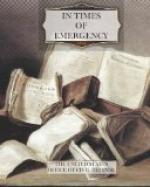CHAPTER 9
EMERGENCY CARE OF THE SICK AND INJURED
SUMMARY
BEFORE AN EMERGENCY
1. Take the Medical Self-Help course, or a First Aid course.
2. If this is not possible, obtain a good first aid manual, study it, and keep it at home; or study the emergency medical instructions given in this chapter, and keep this handbook at home.
3. Obtain a good first aid kit, and keep your home medicine chest well stocked with supplies you may need in a time of emergency.
DURING AN EMERGENCY
1. Try to get a doctor or nurse (or at least a person trained in first aid) to treat anyone who is injured or sick.
2. If no one better qualified is available, take charge yourself.
EMERGENCY CARE OF THE SICK AND INJURED
A nuclear attack on the United States would cause great numbers of casualties, and there would be fewer doctors, nurses and hospitals available to care for them. Even in areas where no nuclear weapons exploded, radioactive fallout could prevent doctors and nurses from reaching injured or sick persons for a considerable period of time.
People would have to help each other during the emergency. Those in a stocked public fallout shelter would have available the basic medical kit stored there, and perhaps one or more shelter occupants might be a doctor, nurse, or trained first-aider. But persons in a home shelter would have only the medical supplies available at home, and would have to depend on their own knowledge of first aid and emergency medical care.
Both adults and teenagers can acquire these valuable skills now by taking free courses that are offered in many communities, such as the Medical Self-Help course or a First Aid course.
The following information is no substitute for one of these courses. This basic guidance may save lives during a nuclear emergency, however, by helping untrained persons take care of the sick and injured when professional medical assistance may not be immediately available.
GENERAL RULES FOR ANY MEDICAL EMERGENCY
1. First of all, do no harm. Often, well-meaning but untrained persons worsen the injury or illness in their attempts to help. Get competent medical assistance, if possible. Do not assume responsibility for a patient if you can get the help of a doctor, nurse, or experienced first-aid worker. But if no one better qualified is available, take charge yourself.
2. Look for stoppage of breathing, and for serious bleeding. These are the two most life-threatening conditions you can do something about. They demand immediate treatment (see pages 58 and 61).




